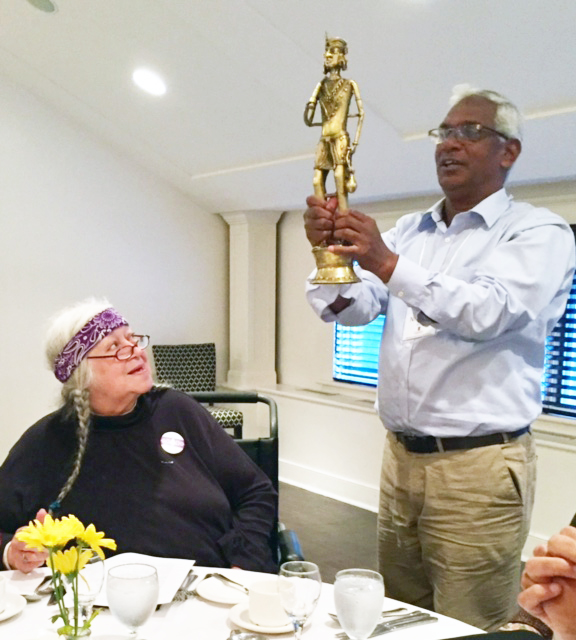Canada-India conference builds on common ground
July 26, 2017
Share
A recent conference hosted by Queen’s University explored the intersection of the Canadian practice of mutual accommodation and India’s use of non-violent action in addressing societal issues.

Gathering on Common Ground: Building Harmony through Diversity in Canada and India brought together approximately 60 people from a broad range of backgrounds, including students and faculty members, as well as representatives from the private and public sectors. Women and men were equally represented and half of attendees were from India or of Indian heritage.
Another key element was the participation of Indigenous people from both Canada and India.
The objective of the conference, explain co-organizers Hugh Helferty, former Executive-in-Residence at the Smith School of Business and current adjunct professor in the Department of Chemistry, and Paul Schwartzentruber, Associate Member, Centre for the Study of Democracy and Diversity, was to build on the experiences in mutual accommodation and non-violent action to help develop innovative, effective approaches and solutions on an array of societal issues.
After opening the conference together on the first day, attendees were placed into workgroups of six to eight people representing a variety of backgrounds.
It was a great opportunity for participants to interconnect and learn from each other, says Dr. Helferty.
“I think the richness of the conversation came from that diversity. We structured the workshops to make sure that we had this mix. I think that helped a lot,” he says. “Mostly this was a group of complete strangers getting together and I really do think we made progress toward creating a community that is willing to take some further action on this. We asked people to work on these problems and come up with ideas about what possibly might be done. The next step is to further understand and develop these ideas, share that, and figure out what to do.”
The workshops approached four challenge areas that India and Canada have in common – Indigenous peoples; minorities – religious and ethnic; poverty and economic inequality and; gender-based struggles for justice.
“These are key themes in the Centre for the Study of Democracy and Diversity”, says Margaret Moore (Political Studies), Director of the centre and a sponsor of the conference.
The result was the sharing of experiences from different viewpoints and the development of novel ideas to help address some of these issues.
“Hugh and I just sort of synchronized on the idea that this should be a working conference where people got into small groups and a very mixed, inter-cultural dialogue happens,” Mr. Schwartzentruber says. “That was, from my point of view, the real success of things, that we had a lively, vibrant debate across many tiers of society and across the countries. People who wouldn’t probably have talked to each other really got into the meaty issues with each other.”
Another commonality is that in 2017 Canada is marking 150 years since its founding while in 2019 India will be celebrating 150 years since the birth of Mahatma Gandhi and his wife Kasturba. In line with this, a follow-up conference is proposed to be held in India in two years’ time.
The conference opened with two keynote addresses on the main themes: William A. Macdonald provided the background on mutual accommodation and Rajagopal PV discussed the role of non-violent social movements in building an inclusive society.
Through the many discussions attendees found that, despite their different histories and social structures, India and Canada have much in common, from the experiences of Indigenous peoples to a history of cooperation and collaboration.
“I think the overarching theme of the conference is this concept of the otherness of the other, of not trying to make the other the same, but to appreciate the otherness of the other,” says Jill Carr-Harris, a specialist on Indian development policies, nonviolence activist, and researcher on poverty reduction, and gender and education, who traveled from India to attend the conference. “One rich idea was to break the majority-minority idea because minorities, marginalized people, are defined by the mainstream, which allows the legitimization of two classes or many classes, different identities, where they are less powerful than the other. What one group decided to do was not talk about multiculturalism, because that is kind of tolerating divisions. So what they talked about is intercultural awareness instead.”
For more information about the conference, including the full program, visit the Centre for the Study of Democracy and Diversity website.